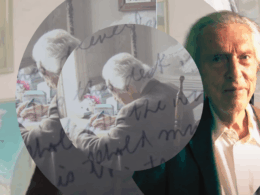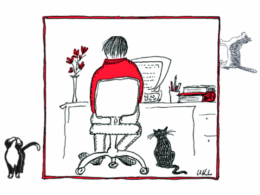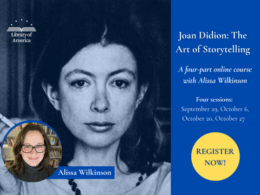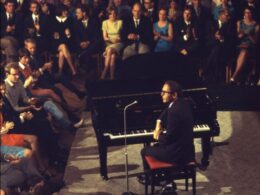Poet, painter, publisher, and activist Lawrence Ferlinghetti turns 100 years old on Sunday, March 24, and in honor of the occasion we turned to Beat Generation authority Bill Morgan for a personal tribute. Among his many works on the Beat Generation and its most prominent writers, Morgan edited I Greet You at the Beginning of a Great Career: The Selected Correspondence of Lawrence Ferlinghetti and Allen Ginsberg, 1955-1997 (City Lights, 2015), which New York Times book critic Dwight Garner just included in his essential Ferlinghetti reading list.
By Bill Morgan
Fifty years ago, as a young college student, I began to work on a comprehensive bibliography of the works of Lawrence Ferlinghetti. Although Lawrence never understood what could be so damned interesting about a definitive list of all his works, he nonetheless answered questions and invited me to San Francisco to look at his papers in person. Not only was I young, but I was equally naive and I thought that putting together a list of his publications would only take a matter of months, a year at the most. Fifty years later, I find that I am still at it, and Lawrence is still at it. And quite honestly, I think he still wonders what could be so damned interesting about bibliographies.
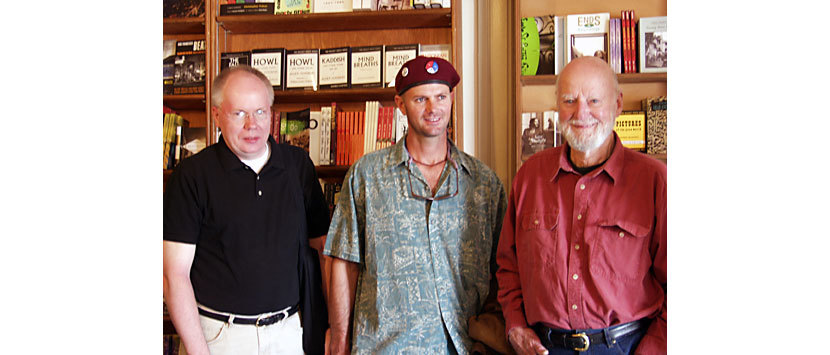
As I look back now over those fifty years, I realize that I’ve known Lawrence longer than I knew my father or grandfather or even my wife. I wish I had written down all the things Lawrence has said to me, but one only remembers the funny things. Once when I was working on a series of guidebooks for City Lights, he remarked that my walking tour books were “too pedestrian.” He decided to spice them up by secretly inserting his own puns and wisecracks, many of them lampooning writers who were not his favorites. City Lights’ editor, Nancy Peters, and I tried to catch them before publication, but a few snuck in, and of course the poets in question attributed his catty remarks to me. Some of the comments were not as spiteful as others and I was glad we left those in. Like his comment on The Dom, which was Warhol’s favorite nightclub for a while. When it closed, Lawrence wrote “the Dom was doomed.” Who could resist leaving that line in? It made me sound witty.
As the years passed, Lawrence continued to feed me information about publications and once or twice a year he’d let me search through his ever-expanding files. At one point the City Lights editorial offices moved into a storefront on the corner of Upper Grant and Filbert and later they took over the apartment on the floor above to host visiting writers and I was honored to work there. Knowing Lawrence opened all the doors for me; when I visited New York City to delve into the files of his publisher, New Directions, James Laughlin gave up his desk to me for the better part of a week.
After a decade, I thought I had tracked down nearly every public utterance that Lawrence ever made and was ready to publish the bibliography. In those days there were still publishers willing to put out massive, scholarly tomes for librarians and researchers. It seemed silly to wait any longer to publish, since Lawrence assured me that in the future he would be much more interested in painting than in poetry. The publication of his Leaves of Life figure studies seemed to prove that. But that was followed within a year by Over All the Obscene Boundaries, the next in a never-ending series of great poetry volumes.
After another decade I published a supplement that was to bring the bibliography up to date. By the 1990s I was feeling pretty certain that there wouldn’t be any other major works coming out. Of course, These Are My Rivers, A Far Rockaway of the Heart, and many other collections followed. Still we pressed on and it was always fun. In our thirtieth year, Lawrence and David Amram spent time at my apartment working on the musical setting for his poem “The Breeding Blues.” After Allen Ginsberg’s death Lawrence stayed with me in New York and read one of his greatest poems, “Ah Allen,” as a tribute to his old friend. Later, in our fortieth year, he stayed at my apartment to accept the Robert Frost Medal, joining the ranks of others, like Edna St. Vincent Millay, Ginsberg, Robert Creeley, and Marianne Moore, who had won that prize.
This year I’m unable to be in San Francisco to celebrate his 100th and our fiftieth because I’ll be in Venice. I’ve been invited to present a program on the Beat Generation in Italy. I’ll be surrounded by people wanting to know more about Ferlinghetti, whom the Italians have claimed as their own national treasure. I wish I could be with him, but I have already circled the date on my calendar for his 110th. And by that time, he’ll have completed a new body of work that will require yet another supplement to his bibliography, of this you can be certain. And he still won’t know why anyone would be interested in studying his life and work.
Bill Morgan is a painter and archival consultant working in New York City. He is the author of several books about the Beat Generation, most recently The Beats Abroad (2015), Peter Orlovsky: A Life in Words (2014), and The Typewriter Is Holy: The Complete, Uncensored History of the Beat Generation (2010). He has edited collections of the writing and correspondence of many of the Beat Generation’s most significant authors, including Ginsberg, Ferlinghetti, Jack Kerouac, William S. Burroughs, Gary Snyder, and Gregory Corso, and has also worked as an archivist for Ginsberg, Abbie Hoffman, Diane diPrima, Oliver Sacks, Arthur Miller, and Timothy Leary.
